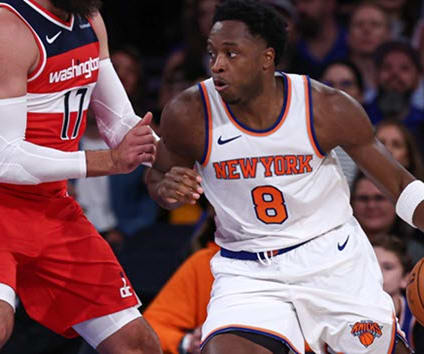2025 Stats
PTS
13.9
REB
4.4
AST
2.2
STL
0.7
BLK
0.2
ROS Projections
2025 Fantasy Outlook
After a hot start to his sixth NBA season in Atlanta with averages of 19.0 points, 3.9 rebounds, 1.5 assists and 2.6 three-pointers, a mid-season trade to the Cavaliers caused his fantasy value to tank. He saw a few fewer minutes per game in Cleveland, and his usage took a hit. He would go on to make 27 appearances with his new club, averaging 14.3 points, 4.2 rebounds, 1.3 assists and 2.2 three-pointers. The Cavaliers will look very similar in 2025-26, but injuries to Darius Garland (toe) and Max Strus (foot) could open the door for Hunter to start on Opening Night - - Garland won't be ready for the start of the campaign, and Strus was given a 3-to-4 month timetable in late August. Hunter can be a steady source of points, rebounds and three-pointers, but his defensive stats (0.7 steals and 0.3 blocks per game for his career) have always been lacking. All things considered, he's likely looking at a late-round valuation for most of the 2025-26 campaign. Read Past Outlooks

Struggles in victory
Hunter notched four points (1-6 FG, 1-6 3Pt, 1-2 FT), four rebounds, one assist and one steal across 13 minutes during Wednesday's 94-87 victory over the Hornets.
ANALYSIS
Hunter was unable to have a positive impact, scoring no more than four points for the third time in the past six games. Despite a relatively consistent role, Hunter has been a non-factor for the majority of the season, currently sitting outside the top 200 in standard leagues. At best, he can be streamed in for points and threes.
Hunter was unable to have a positive impact, scoring no more than four points for the third time in the past six games. Despite a relatively consistent role, Hunter has been a non-factor for the majority of the season, currently sitting outside the top 200 in standard leagues. At best, he can be streamed in for points and threes.
NBA Per Game Stats
Per Game
Total
Per 36
NBA Per Game Stats
Loading Per Game Stats...
2025 NBA Game Log
2025
2024
2023
2022
2021
2020
2019
2025 NBA Per Game Split Stats
Schedule
By Month
Starting/Off Bench
Days Rest
Vs Opp
By Result
2025 NBA Per Game Split Stats
Loading Split Stats...
Advanced Stats
Loading Advanced Stats...
Stat Review
2025
2024
2023
2022
2021
2020
2019
How does De'Andre Hunter compare to other players?
This section compares his stats with all players from the previous three seasons (minimum 200 minutes played)*. The bar represents the player's percentile rank. For example, if the bar is halfway across, then the player falls into the 50th percentile for that stat and it would be considered average.
True Shooting %
55.5%
Effective Field Goal %
49.8%
3-Point Attempt Rate
49.4%
Free Throw Rate
29.3%
Offensive Rebound %
2.8%
Defensive Rebound %
15.2%
Total Rebound %
8.9%
Assist %
11.4%
Steal %
1.0%
Block %
0.5%
Turnover %
10.3%
Usage %
22.1%
Fantasy Points Per Game
23.1
Fantasy Points Per Minute
0.9
NBA Historical Fantasy Stats
Historical ADP
Loading Historical ADP...
Cavaliers Depth Chart
Our full team depth charts are reserved for RotoWire subscribers.
Subscribe Now
Cavaliers Rotation: Minutes Breakdown
Loading Cavaliers Rotation Data...
Average Fantasy Points
Minutes
FanDuel
DraftKings
Yahoo
FantasyDraft
Head2Head
Sorare
Average Fantasy Points are determined when De'Andre Hunter was active vs. non-active during the season. Click here to view average fantasy points for a different time period.
Loading Average Minutes...
Past Fantasy Outlooks
2024
2023
2022
2021
2020
2019
Hunter was a regular starter for the Hawks in the early months of the 2023-24 season. However, a knee injury sidelined him for 19 games between Dec. 22 and Jan. 28. By the time he returned to action, the emergence of Jalen Johnson moved Hunter to a bench role the rest of the way. Hunter started Atlanta's final 14 contests, but he projects to be a bench player in 2024-25, with highly-touted rookie Zaccharie Risacher and Johnson slated to start in the frontcourt. On paper, Hunter shouldn't have a lot of fantasy appeal as long as he plays off the bench for Atlanta, but he might be worth a late flyer in deep formats since he still averaged 16.0 points per game while posting a 49.1/42.0/81.7 shooting line across 20 appearances off the bench (26.1 minutes per game). He's a player worth keeping close tabs on. The bench role might not fully determine how many minutes he'll get in the rotation, thus making him a viable alternative in most formats. Hunter remains a player who can step up any night. He reached the 20-point mark in 19 of his 57 appearances last season.
More Fantasy News

Scores 16 off bench in win
Hunter had 16 points (7-13 FG, 2-5 3Pt), four assists, three rebounds, one block and one steal across 31 minutes during Friday's 117-115 victory over the 76ers.
ANALYSIS
Subscribe now to instantly reveal our take on this news.
Subscribe now to instantly reveal our take on this news.

Improved performance Wednesday
Hunter notched 17 points (7-13 FG, 3-7 3Pt), four rebounds and four assists across 22 minutes during Wednesday's 133-107 win over the 76ers.
ANALYSIS
Subscribe now to instantly reveal our take on this news.
Subscribe now to instantly reveal our take on this news.

Poor showing in loss
Hunter totaled two points (1-5 FG, 0-2 3Pt) and three assists over 18 minutes during Monday's 123-112 loss to the Jazz.
ANALYSIS
Subscribe now to instantly reveal our take on this news.
Subscribe now to instantly reveal our take on this news.

Effective in 22 minutes
Hunter logged 12 points (5-9 FG, 0-1 3Pt, 2-2 FT), nine rebounds and two assists over 22 minutes during Tuesday's 120-116 victory over the Pacers.
ANALYSIS
Subscribe now to instantly reveal our take on this news.
Subscribe now to instantly reveal our take on this news.

Scores 16 points in return
Hunter had 16 points (5-12 FG, 2-7 3Pt, 4-4 FT), five rebounds, four assists and one steal in 26 minutes during Friday's 113-108 victory over Denver.
ANALYSIS
Subscribe now to instantly reveal our take on this news.
Subscribe now to instantly reveal our take on this news.
Latest Fantasy Rumors

Wants out of Cleveland?
Hunter wants out of Cleveland, according to NBA reporter Matt Moore.
ANALYSIS
"Among the things I tend to squint skeptically at is when someone says 'that guy wants out bad.' NBA players do tend to have a pretty good perspective that they make tens of millions to play basketball and that their worst situation is still pretty good," Moore said. "But there's a lot of smoke around the idea that De'Andre Hunter, or at least his representation, would prefer he be somewhere else." Hunter's minutes have dropped to 27.0 minutes per game this season, and the Cavaliers seem to have lost a lot of steam since 2024-25 as a contender. With the emergence of Jaylon Tyson and Sam Merrill in Cleveland, Hunter may be expendable for the franchise.
"Among the things I tend to squint skeptically at is when someone says 'that guy wants out bad.' NBA players do tend to have a pretty good perspective that they make tens of millions to play basketball and that their worst situation is still pretty good," Moore said. "But there's a lot of smoke around the idea that De'Andre Hunter, or at least his representation, would prefer he be somewhere else." Hunter's minutes have dropped to 27.0 minutes per game this season, and the Cavaliers seem to have lost a lot of steam since 2024-25 as a contender. With the emergence of Jaylon Tyson and Sam Merrill in Cleveland, Hunter may be expendable for the franchise.





